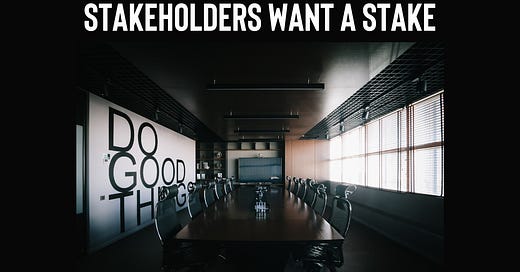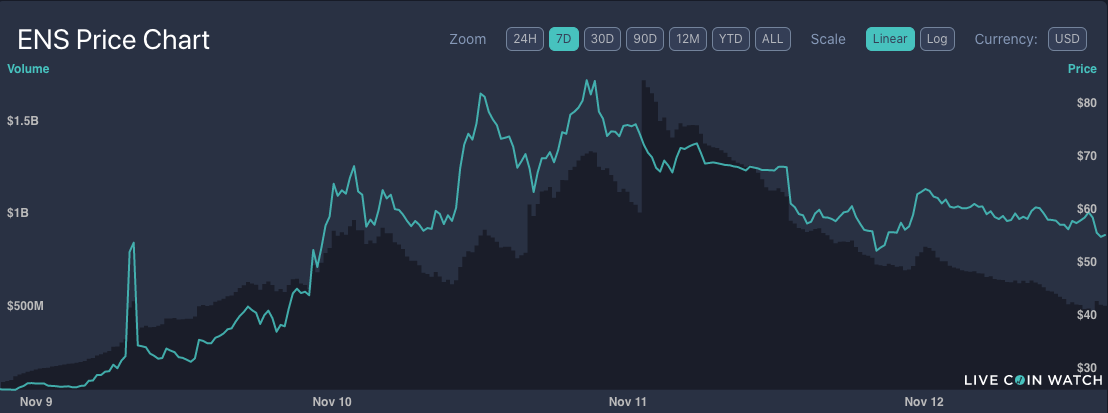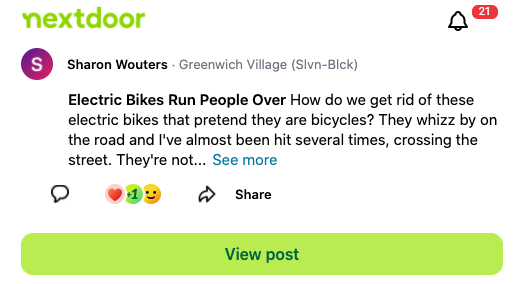I was a token drop virgin until last Monday.
ENS stands for Ethereum Name Service. It's a personalized web domain for Ethereum addresses and metadata. ENS is based on the concept of DNS, Domain Name Service, which helps users find websites via names rather than numbers, e.g., you can access www.katelyndonnelly.com instead of https://10.110.3203.223 because you aren't going to remember the latter.
For ENS, that means instead of pasting a complicated wallet code that looks something like 0x26a0f31.....Cf236, I can type katelynd.eth, and the funds or data will flow to the same place. It's a lot easier to remember katelynd.eth than, you know, that other string. Same concept as DNS.
I bought my ENS, katelynd.eth, for $11.04 on the day of the transaction ($13.48 today) with a gas fee (transaction cost of using the Ethereum main net blockchain) of $115.40 ($140.92 today) on September 4th, 2021. You can see the record of this transaction on Etherscan. I thought it was a fun, early adopter move. It would make some transactions or interactions easier. It would make me more identifiable when I use that wallet to contribute to larger projects. I didn't have any additional expectations.
Fast forward to Monday night, November 8th, the ENS Foundation, which manages ENS, conducted a token launch for their earliest >137k accounts. These tokens would represent in total 25% of the ENS cap table. I learned about this token drop only a few days prior. The reasoning for the drop is described in detail on ENS's mirror, including an exact calculation of the tokens based on the number of days you held the ENS and how much time you bought it.
I went to claim my drop tokens. I connected my wallet, and the algorithm spun out that I was to receive 113 ENS. Processing the transaction took about 20 minutes and required a painful gas fee of around $200. Other than the gas and the wait, the user experience was seamless.
I voted on a few governance proposals and delegated my representation to someone I know from the ecosystem. As I write, these tokens have a market value of $6,220.36. Here is the place to watch the prices on Live Coin Watch.
Wow. At 4661.44% IRR that's my best investment return of 2021.
Price of ENS over five days post drop
I'm not alone. 137,689 other people qualified for a token drop. You can transparently follow the market dynamics on Dune. 14,302 wallets received between 50 to 100 tokens each.
There were no investors or capital providers in ENS, so no investors received tokens. Only individuals or owners of ENS wallets.
It feels like money was invented out of thin air. Or, maybe the value was sitting there all along, and it's no different than a high-priced technology company IPO on the Nasdaq with instant liquidity. Maybe this is what it feels like to be an angel investor in Uber or Rivian. Except instead of waiting ten years, it happens in two months.
What do you have to believe for $ENS to make sense? Disco Mude sums it up well below. And, fair enough.
What are the implications?
The ENS drop made real what is possible with distributed ownership and no capital investors. The size and scale of the drop was significant - 137,689 individuals with an average value of 181 tokens. The entire drop of 25 million represents 25% of all tokens that will ever be in circulation. There weren't any investors in ENS so large, outsized rewards likely went to the early contributors and employees.
ENS drop showed there was a way to distribute value that didn’t feel rigged. I haven’t heard anyone say this wasn’t fair. The process was transparent, back-dated so rewarded for past actions, not time-sensitive. Drop timing in web3 often feels like a gold rush whereas you have almost half a year here to claim your tokens. The attempt at fairness through an algorithm (combo of time, money, and effort in system) also worked with 14,302 wallets receiving between 50 to 100 tokens each.
There will be more and more token drops and instant liquidity grants to community members and first believers of organizations, companies, and brands. Those who get in early, participate, add value, and bring belief will expect to get rewarded. If they don't, then I think it opens up the network to competitive threats.
The implications of distributive ownership will go far beyond the crypto/web3 ecosystem and lead to a questioning of all companies and value distribution processes. For example, two companies IPO'ed this week. All Birds and Nextdoor. I don't own stock in either one. Let me explain why that might matter more in the future.
Allbirds IPO: Meh.
I own three pairs of Allbirds, including a double of one model that I particularly love (this one, if you’re curious). I couldn't have cared less about the economic entity that is the company. Maybe the IPO will do well. Perhaps, it won't. It doesn't matter to me in the slightest; I don't have a stake or loyalty. I simply have historical transactions with Allbirds. If another organization comes along with a better product, I wouldn’t think twice about Allbirds the company.
No one from Allbirds has ever asked for my input on their new shoe design. No one has informed me of the Allbirds plan for the future, and they haven't asked me to vote on anything important to the company. Is the company even sustainable? Buying three pairs of shoes doesn’t seem particularly great for the environment. They have not talked to me as a community member. They'll have to win me over again. Maybe they don’t have to. Maybe they keep producing great shoes and I remain a customer.
Nextdoor IPO: Meh.
Similarly, Nextdoor IPO'ed this week. It might have been exciting for the employees with large equity stakes and the venture capitalists, but did any users on the platform economically benefit? Not that I can tell. It will be difficult for these companies to claim that they care about their community without giving any governance or economic stake.
I get almost zero utility out of Nextdoor.
It's an irrelevant message board with noise from people who have too much time on their hands. I haven't deleted it on the super outside chance of 'what if' someday it could be useful for something, and I should stay curious. However, Nextdoor would probably have more valuable insight if more people felt incentivized to contribute genuine content. They would be rewarded for answering messages faster. It might feel less like a random complaint dump.
For both Allbirds and Nextdoor, it doesn't have to be this way. At least any more. Allbirds has most of the data needed to create a reward equation (even if it doesn’t sit on blockchain). They could do it fairly and transparently if they wanted to. There’s no excuse now that ‘it’s impossible to figure out.’
Bottom line: I am a stakeholder (or owner) of $ENS. I am a customer of Allbirds. I am a reluctant user of Nextdoor. Only one of those three is set to stick as I roll the clock forward.
Sharing the wealth: enter web3
All brands and commercial products will need to be reimagined in the era of web3. Those who are selfish and don't actively think about their community will be left behind. The economics behind a company hits different. Being an owner changes your relationship with the organization and the company. Companies that don't use incentives and share the wealth they are building are vulnerable to disruption.
The companies that execute this strategy well will win: the fairer the distribution, the most competitive the organization will be in the marketplace.
There is almost no excuse now for a brand, platform, or company not to build mechanisms to raise money or distribute value to users. Companies can use Republic, Wefunder, and soon Kontinuous in the UK to directly raise capital from accredited individual investors. As ENS showed, they could have used some token system for buyers to claim value linked to their IPO cap tables.
We are still in the early days of the ownership economy revolution. This week was a noticeable change by the lived experience of cold, hard cash from a token drop.
Once a belief can turn into reality, it makes it an unstoppable trend that is obviously the future.
Additional questions worth exploring:
Is it still worth getting an ENS? Yes. This is just the beginning of the Ethereum ecosystem and, who knows, there could be another drop in the future. 50% of the tokens are still held in the ENS treasury.
What happens when token drops become expected? Do people find it less exciting? Are they less likely to be happy with the outcome? Will bigger players try to rig? Once the blueprint is laid out, more sophisticated players will find ways to game the system and set up arbitraged trades.
What will happen with Solana? I don't know but you can register a .sol address here.









